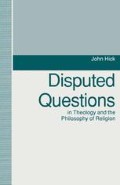Abstract
In considering the ‘conflicting truth claims’ of the different religions we need not only a theory of religious knowledge but also a theory of religious ignorance. And I think that we have a very good start to such a theory in the Buddha’s doctrine of the avyakata or, as the term is often translated, the undetermined questions.
Access this chapter
Tax calculation will be finalised at checkout
Purchases are for personal use only
Preview
Unable to display preview. Download preview PDF.
Notes
Edward Conze, Buddhism, Its Essence and Development ( 1951; New York: Harper Torchbooks, 1975 ) p. 39.
Masao Abe, ‘A Dynamic Unity in Religious Pluralism: a Proposal from the Buddhist Point of View’, in The Experience of Religious Diversity, ed. J. Hick and H. Askari ( Aldershot: Gower, 1985 ).
Author information
Authors and Affiliations
Copyright information
© 1993 John Hick
About this chapter
Cite this chapter
Hick, J. (1993). The Buddha’s Doctrine of the ‘Undetermined Questions’. In: Disputed Questions in Theology and the Philosophy of Religion. Palgrave Macmillan, London. https://doi.org/10.1007/978-1-349-12695-8_6
Download citation
DOI: https://doi.org/10.1007/978-1-349-12695-8_6
Publisher Name: Palgrave Macmillan, London
Print ISBN: 978-1-349-12697-2
Online ISBN: 978-1-349-12695-8
eBook Packages: Palgrave Religion & Philosophy CollectionPhilosophy and Religion (R0)

